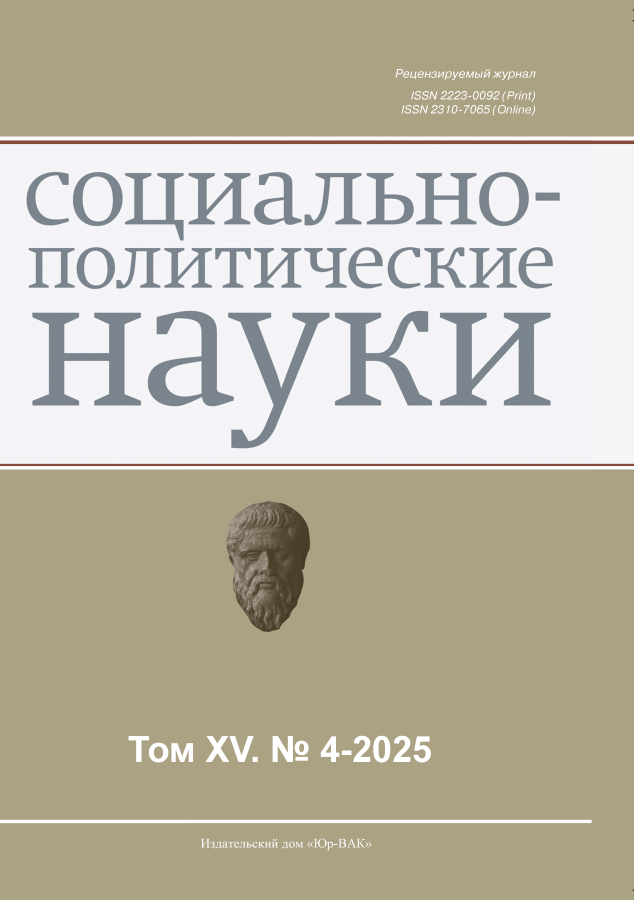The role of political consciousness in building Russia as a country-civilization
- 作者: Bulavina M.A.1, Legoshin A.I.1
-
隶属关系:
- Zhirinovsky University of World Civilizations
- 期: 卷 15, 编号 4 (2025)
- 页面: 88-96
- 栏目: Political Institutions, Processes and Technologies
- URL: https://journal-vniispk.ru/2223-0092/article/view/348437
- DOI: https://doi.org/10.33693/2223-0092-2025-15-4-88-96
- EDN: https://elibrary.ru/WSSJUB
- ID: 348437
如何引用文章
详细
This article primarily examines the importance of studying political consciousness as a phenomenon that can become the basis for the development and construction of Russia as a country of civilization. The article provides information on the achievements of Russian scientists who have contributed to the study of political consciousness. An important component of the article is to emphasize the fact that, based on the ongoing work with the population that existed during the Soviet era, in particular, on developments that made it possible to unite not only certain categories of the population, but also the entire society as a whole, scientists and politicians can borrow certain elements of social management of the past era to integrate them into modern realities. The article pays special attention to the importance of forming political consciousness with the expectation that the geopolitical changes taking place in the modern world can cause social upheavals, which can be leveled through the introduction of a well-structured system of political consciousness of the population, serving as a socio-psychological shield against possible future political turbulence.
作者简介
Maria Bulavina
Zhirinovsky University of World Civilizations
编辑信件的主要联系方式.
Email: m.a.bulavina@uwc-i.ru
SPIN 代码: 2292-4709
Cand. Sci. (Law), Associate Professor, Vice-Rector for Research
俄罗斯联邦, MoscowAleksey Legoshin
Zhirinovsky University of World Civilizations
Email: ringlevit@yandex.ru
SPIN 代码: 6958-8807
postgraduate student
俄罗斯联邦, Moscow参考
- Berger P., Lukman T. Social construction of reality. A treatise on the sociology of knowledge. Moscow: Medium, 1995. 323 p.
- Bulavina M.A., Novoselsky S.O. Science and education in Russia and Donbass: comparative legal analysis and prospects for cooperation. In: Russia and Donbass: Prospects for cooperation and integration. Proceedings of the International Scientific and Practical Conference. Moscow, 2022. Pp. 230–234.
- Bulavina M.A., Novoselsky S.O. The role of higher education in ensuring national security of the Russian Federation in the context of the crisis of international relations. In: Trends in the development of the system of international relations and their impact on the management of the national defense of the Russian Federation. Moscow, 2023. Pp. 76–83.
- Ivanov D.Yu. Concepts of political pictures of the world of the Eurasian space in the communicative practice of analytical centers. Eurasian Integration: Economics, Law, Politics. 2023. Vol. 17. No. 4. Pp. 121–132. (In Rus.)
- Kirsanov K.A. Basic provisions of the creative-developing educational paradigm. World of Science. 2016. Vol. 4. No. 6. (In Rus.)
- Kirsanov K.A., Popova S.A. Formation of the economy of intellectual labor of the individual through the transformation of modern ideological doctrines. In: Russia and the world: The development of civilizations. Scientific heritage and views of V.V. Zhirinovsky on the emerging world order. Proceedings of the XIII International Scientific and Practical Conference. Moscow, 2023. 403 p.
- Lapkin V.V. Territorial state and complex society: The imperative of coevolution in the space of politics. Polis. Political Studies. 2023. No. 5. Pp. 172–191. (In Rus.)
- Motorin D.I. Pictures of the world of large social groups as a factor in changes in political institutions. Political institutions in the modern world: Collapse or reboot? In: Collection of materials based on the results of the All-Russian Scientific Conference (St. Petersburg, October 12–13, 2023). St. Petersburg: Skifiya-print, 2023. 302 p.
- Myurberg I.I. Russian civilizational project: political and ideological perspective. Problems of Civilizational Development. 2023. Vol. 5. No. 1. Pp. 5–27. (In Rus.)
- Parsons T. On the structure of social action. Moscow: Academic Project, 2000. 880 p.
- Pyrma R.V. Theoretical aspects of the study of political preferences of Russian youth. Power. 2020. No. 4. Pp. 157–162. (In Rus.)
- Habermas J. Theory of communicative activity. In 2 vols. A.K. Sudakov (transl. from German). Moscow: Ves Mir. 2022. 880 p.
- Shestopal E.B. Political psychology. Moscow: Infra-M, 2002. 448 p.
- Schmitt K. The concept of the political. St. Petersburg: Nauka, 2016. 568 p.
- Schütz A. Selected works: A world shining with meaning. Transl. from German and English. Moscow: ROSSPEN. 2004. 1056 p.
补充文件








